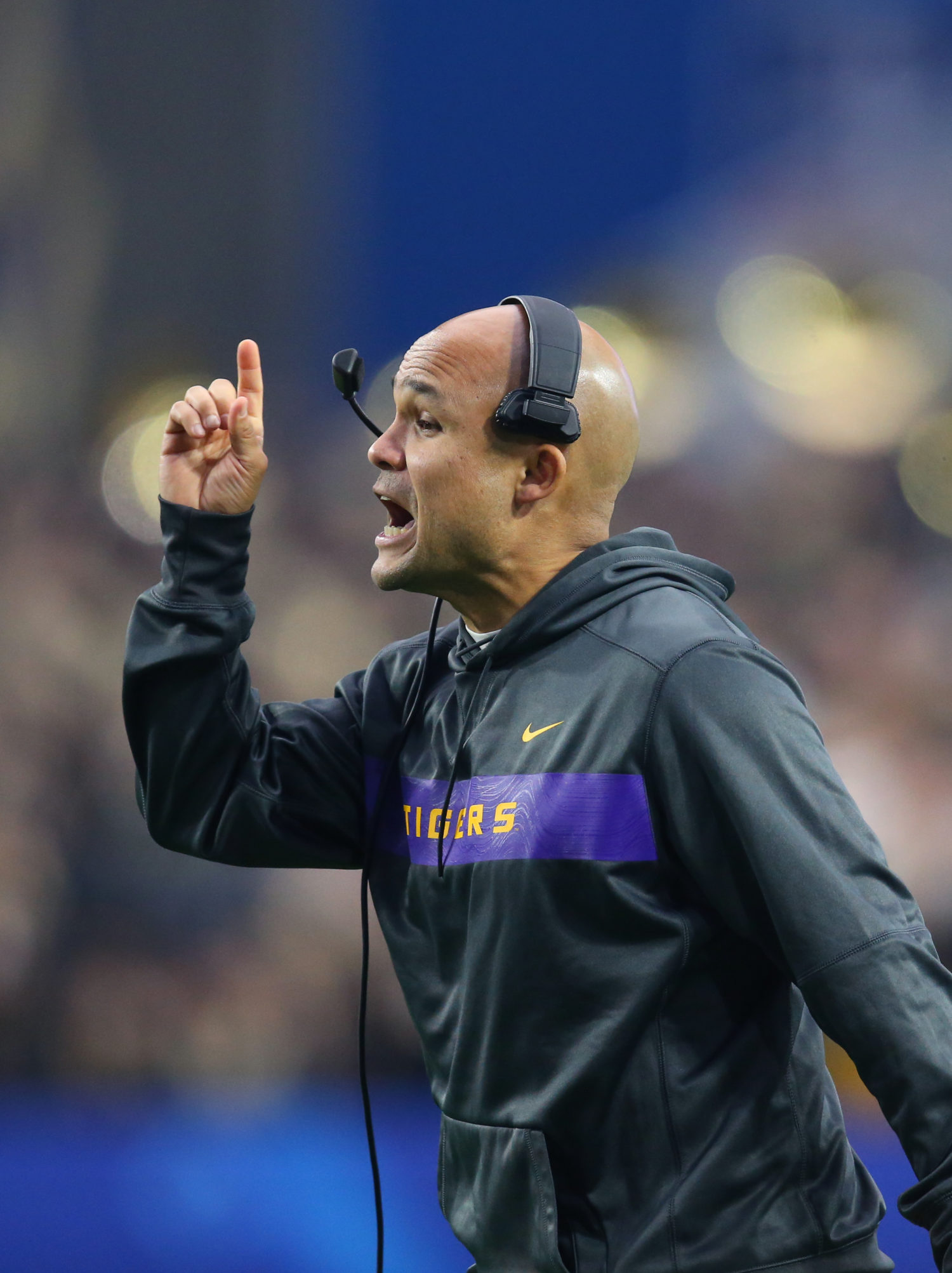
LSU football: Still questioning Dave Aranda or his defense? Don’t
By Les East
Published:
Dave Aranda didn’t forget how to coach.
It might have looked that way when the highly-regarded, highly-paid coordinator wasn’t able to coax the high level of performance out of his defense that has been the LSU standard throughout the previous 3 seasons of his tenure.
The undefeated Tigers had some inconsistent and even downright poor performances this season even as the team piled up victories and ascended to a No. 1 ranking on its way to meeting Clemson in the CFP Championship Game on Monday night.
In the 2nd game of the season, Texas scored 38 points and accumulated 409 passing yards and 530 total yards.
Two weeks later Vanderbilt – as in, Vanderbilt – matched Texas’ 38 points.
In the biggest game of the season – to that point – Alabama scored 41 points and passed for 418 yards.
A week later, Ole Miss, for crying out loud, scored 37 points, but more alarmingly had 614 yards, including 402 rushing.
Even though LSU shored up its defense somewhat in a rout of Arkansas a week after that, the CFP committee – not to mention a whole bunch of LSU fans – started wondering if this shaky defense was going to be the Tigers’ undoing and prevent them from being able to handle Ohio State, which temporarily jumped LSU to No. 1 in the CFP rankings, or Clemson or maybe even Georgia or Oklahoma.
But the game against Ole Miss was where the defense bottomed out. After the marginal improvement against Arkansas, LSU swarmed Texas A&M in a 50-7 victory in the regular-season finale.
The Tigers shut down an admittedly short-handed Georgia offense in an easy 37-10 win in the SEC Championship Game.
They slowed down Oklahoma in the CFP semifinal in the Chick-fil-A Peach Bowl, though the Sooners wound up with 28 points in a 35-point thrashing that was decided at halftime.
So LSU enters Monday night’s championship game looking like a team with a championship-worthy defense. It’s not the equivalent of Clemson’s defense, but it’s far, far better than it was for most of the regular season.
There are a few reasons for the turnaround.
Key players who were sidelined or limited by injury are healthy and playing their best. The most notable examples are pass rusher K’Lavon Chaisson and All-American safety Grant Delpit.
Chaisson wasn’t disruptive for most of the regular season, but in the postseason he has been a consistently disruptive force in opposing backfields.
Delpit missed some time and missed a bunch of tackles during the regular season. But he’s back to being the elite player he was last season. His ability to stop the run, rush the passer and defend the pass equally well makes him a unique player on this defense.
A second factor in the recent surge has been a more attacking style, which might be related to the improved health.
The Tigers, at head coach Ed Orgeron’s urging, have blitzed more down the stretch, especially early in games. The increased pressure on opposing quarterbacks has contributed to better defensive play overall.
All of those factors add up to Aranda figuring out how to best unleash this defense and these defensive players within the context of practicing against and playing with an offense unlike anything LSU has ever had.
Aranda, who doubles as linebackers coach, is still the guy who helped mold Devin White into the Tigers’ only Butkus Award winner.
He’s still the same guy who held soon-to-be NFL MVP Lamar Jackson without a touchdown for the only time in his Heisman Trophy-winning season.
He’s still the same guy who helped Arden Key set an LSU single-season record with 12 sacks.
He’s still the same guy whose defense led the way as the Tigers improved their record in each of Aranda’s seasons while Orgeron was figuring out what to do with the offense.
Ever since that sloppy performance against Ole Miss – in a game that LSU led 28-0 in the 2nd quarter and never by less than 2 scores after that on the way to a 21-point final margin – Aranda’s defense has been outstanding.
The 4 subsequent opponents had a total of 344 rushing yards. That’s 58 fewer yards than the Rebels had by themselves and an average of 86 per game.
Those opponents had a total of 737 passing yards for an average of 184.4 and they averaged a mere 270.3 total yards. They scored 65 points for an average of 16.3.
No one – not even Clemson – is going to beat Joe Burrow scoring in the teens.
Les East is a New Orleans-based football writer who covers LSU for SaturdayDownSouth.com. Follow him on Twitter @Les_East.







